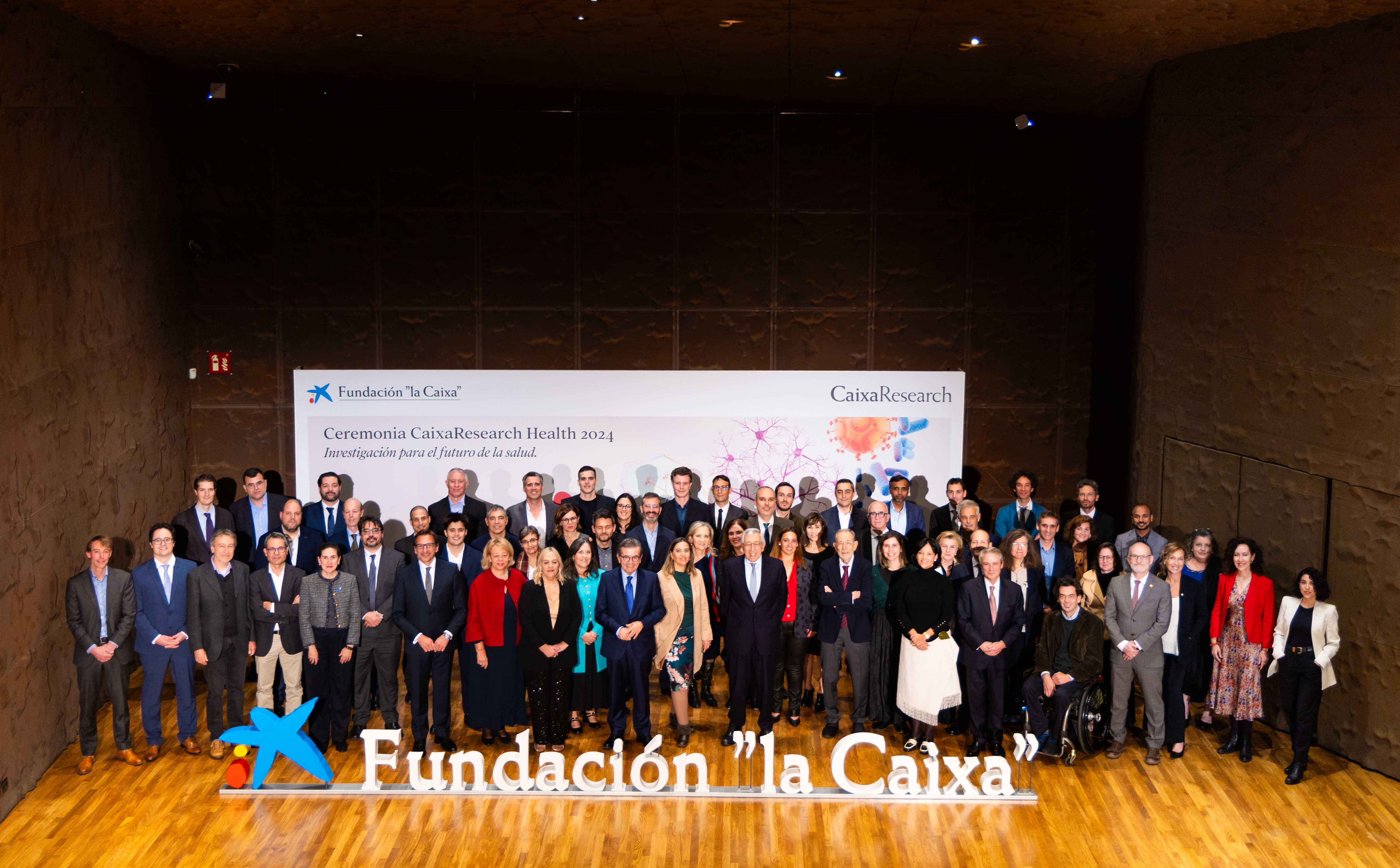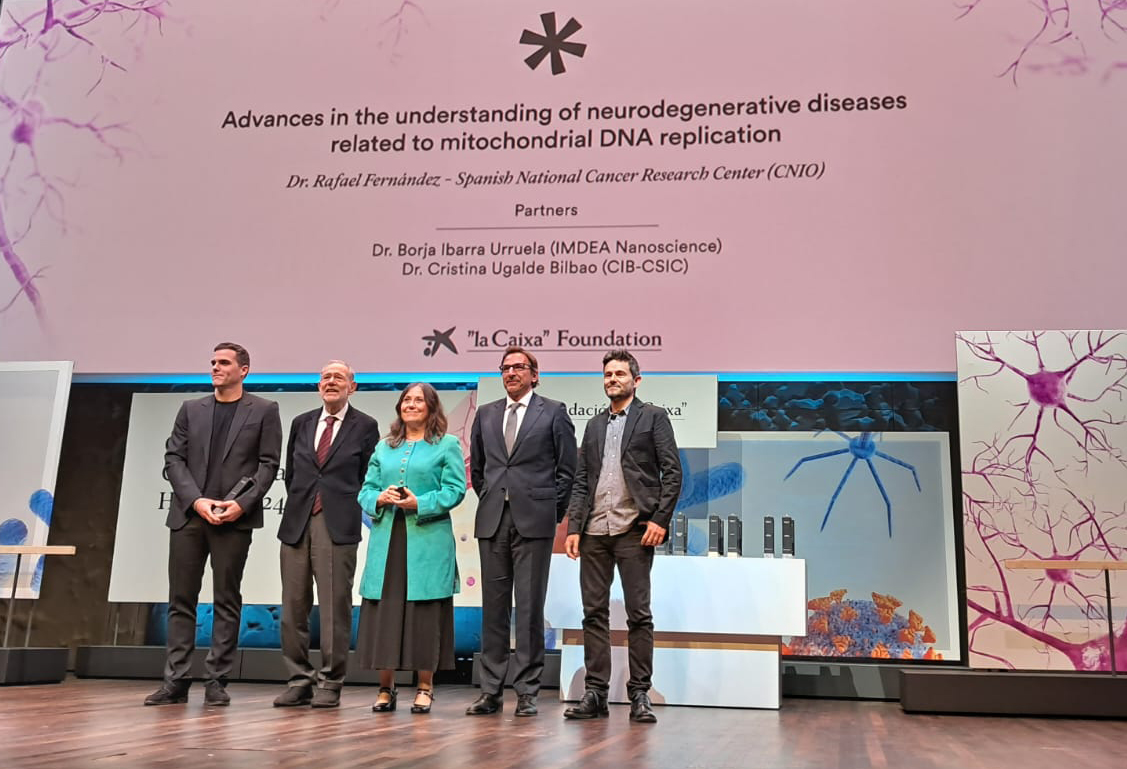
At an event held on November 12 at CaixaForum Madrid, the ‘la Caixa’ Foundation presented the 29 new biomedical research projects of excellence with great social impact selected as part of the CaixaResearch call for Research in Health 2024, with funding of 25.7 million euros, two of them for researchers at the Margarita Salas Center for Biological Research (CSIC). The researcher Ruth Pérez is leading a project focused on the search for a new strategy to combat malaria. Cristina Ugalde is participating in the consortium led by Rafael Fernández Leiro (CNIO) which will advance the understanding of neurodegenerative diseases related to mitochondrial DNA replication.
The call, to which 580 basic, clinical, and translational research proposals were submitted in this seventh edition, is especially aimed at addressing health challenges in different areas: infectious diseases (with 7 selected projects), oncology (6), cardiovascular and metabolic diseases (5), and neurosciences (5). In addition, another 6 selected initiatives will develop enabling technologies in one of these fields.
The CaixaResearch Call for Research in Health is a competitive call in collaboration with the Fundação para a Ciência e a Tecnologia (FCT) of the Portuguese Ministry of Science, Technology and Higher Education, which is providing 2.9 million euros to subsidize 3 of the 9 Portuguese projects selected in this edition. It is also supported by the Luzón Foundation, which, together with the ‘la Caixa’ Foundation, is subsidizing a project on amyotrophic lateral sclerosis (ALS).
The award ceremony was attended by representatives of the ‘la Caixa’ Foundation, including the Deputy Director General, Juan Ramón Fuertes; the President of the Scientific Committee, Javier Solana; the Director of the Area of Relations with Research and Health Institutions, Ignasi López, and the trustee of the Foundation and Honorary President of the Banco Português de Investimento (BPI), Artur Santos Silva. Additionally, were present the president of the Luzón Foundation, María José Arregui, and the president of the FCT Board of Trustees, Madalena Alves, as well as the researchers leading the projects.
A new strategy to combat malaria by attacking a weak point in the biology of the parasite that causes it.
- Project leader: Ruth Pérez, of the Margarita Salas Center for Biological Research (CIB-CSIC)
- Project in consortium with Gonzalo Jiménez-Osés, from the Asociación Centro de Investigación Cooperativa en Biociencias (CIC bioGUNE), and Jude Marek Przyborski, from the Justus-Liebig-Universität Gießen (Germany)
- Grant received: 999,400 euros

Malaria is an infectious disease caused by the Plasmodium falciparum parasite and transmitted by the bite of an infected mosquito of the genus Anopheles. Despite partial successes in malaria control, the disease remains common in tropical and subtropical countries. Every year about 290 million people contract malaria and more than 600,000 die from the disease. The main victims are pregnant women and children under the age of five. The burden of the disease also hampers the sustained economic development of affected countries, especially in the third world.
Despite major efforts by researchers to develop a vaccine and drugs to treat the disease, there are currently no effective treatments in widespread use. One of the main obstacles to achieving this is the resistance that the parasite eventually generates against drugs, even the most modern ones. It is therefore a priority to rapidly find new molecules that address alternative therapeutic targets.
In this sense, this project will use the parasite’s biology against it. Previous studies have shown that the parasite has a complex life cycle that forces it to adapt and respond rapidly to changing conditions and cellular stress. Proteins involved in the regulation of redox balance are essential for the parasite's survival and, at the same time, are distinct from those used by the human host, providing a valuable window of therapeutic opportunity. To develop more effective and safer drugs for children and pregnant women, particularly vulnerable to the disease, the project will focus on discovering new drugs that selectively block the activity of proteins involved in redox balance, thereby killing the parasite.
Advances in the understanding of neurodegenerative diseases related to mitochondrial DNA replication
- Project leader: Rafael Fernández Leiro, of the Spanish National Cancer Research Centre (CNIO)
- Project in consortium with Borja Ibarra Urruela, from IMDEA Nanoscience, and Cristina Ugalde Bilbao, from the Margarita Salas Center for Biological Research (CIB-CSIC)
- Grant received: 900,300 euros

In addition to nuclear DNA, our cells contain a second genome within the mitochondria, the mitochondrial DNA, and its correct replication is crucial for human health. Alterations in this process lead to the development of serious neurodegenerative disorders, such as mitochondrial encephalopathies, which are rare, or more prevalent diseases, such as Alzheimer's or Parkinson's, as well as several types of cancer.
Errors occurring during replication are the main cause of these alterations in mitochondrial DNA. Despite its relevance to human health, this process is not well understood. A better understanding of the mechanisms of mitochondrial DNA replication would, therefore, open the door to understanding the effects of mutations and the processes that lead to the onset of disease.
Building on previous studies that have obtained promising results, in the present project the team will further study the mechanisms of mitochondrial DNA replication to offer new perspectives that will help to understand how diseases related to these processes occur and allow new therapies to be developed.

